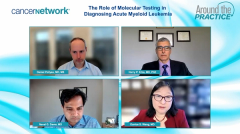
The Potential Role of Menin Inhibitors in the Front-Line Treatment of AML
The expert panel review recently reported data from clinical trials evaluating menin inhibitors, including ziftomenib and revumenib, in the treatment of relapsed AML and how these treatments may fit into first-line settings.
Episodes in this series

Transcript:
Naval G. Daver, MD: I think the big question now looming is, what about menin inhibitors? VEN [fludarabine, cytarabine, and filgrastim] may [offer] some benefit and GO [ozogamicin], maybe yes and no. But let’s say we have a trial or you have a trial with a frontline menin inhibitor, whether it’s 3+7 with one of the menin [inhibitors] or FLAG-IDA with 1 of the menin [inhibitors], what would you think about for newly diagnosed fit, young patient [with] NPM1, non-FLT3 MLL? Is that your go-to or would you say, well, no, I still want to go with the GO or VEN-based approaches? Maybe I’ll start here with Eunice. What are your thoughts?
Eunice S. Wang, MD: I’ve been very impressed with the data to date with the 2 most advanced menin inhibitors in clinic development, the revumenib, or the Syndax compound, and ziftomenib, the Kura Oncology compound. More of my personal experience has been with the ziftomenib and primarily at the doses that it has been tested as presented by [Amir] Fathi [,MD, MPH, Massachusetts General Hospital, Boston] at the recent EHA [European Hematology Association] meeting.
There has been documented activity in heavily pretreated patients with NPM1-mutant disease. When you look at the results of that first phase 1b/2 study about the overall response rate, [in] very heavily pretreated [patients with] relapsed/refractory NPM1-mutant [disease, it] was 45%, with about 35% true CR [complete response] full count recovery. Major [adverse] effects were differentiation syndrome [DS], which was actually manageable with mitigation strategies, with less than grade 2 in the majority of patients, 1 [was] grade 3. [There were] no treatment-related deaths due to DS on that latest cohort of 20 patients, and no QTc prolongation, which was a concern that was seen with the prior revumenib. Given that the menin inhibitor seems relatively well tolerated with the only potential [adverse] effect of differentiation syndrome, no QTc prolongation, no myelosuppression, I think it seems to be an ideal agent to add to induction chemotherapy. So, the toxic effects of the 7+3 or the FLAG-IDA or the whatever you want to add as your backbone intensive chemotherapy, we really attenuate any potential differentiation syndrome by decreasing the leukocytosis and decreasing the disease burden. There’s no QTc prolongation, no potential myelosuppression leading to prolonged count recovery.
So, I think that combination, at least theoretically, looks somewhat appealing. And I think more generally, the thought that you might be targeting a foundational driver mutation, NPM1, as opposed to a secondary downstream mutation like FLT3 makes it even, theoretically only, attractive to maybe supplant or to complement their activity of FLT3 inhibitors for patients in that space. However, I’d love to hear from other people what your thoughts are. I know Dr Erba was the first author on the ASH [American Society of Hematology] abstract and also has extensive experience. And I know my colleagues also have used other menin inhibitors in clinical trials and what your impression are. But I’ve been pretty impressed, and I do think be these menin inhibitors the beginning of a new class of targeted agents for these molecular subsets.
Harry P. Erba, MD, PhD: I agree with everything that Eunice has said about the NPM1-mutant…I always agree with everything she says with all of her experience up there in Buffalo. In any case, what I was going to say was when the EHA abstract presented by Dr Fathi, as a late-breaking abstract at EHA, the response rate with ziftomenib [in patients with] NPM1-mutated [disease], with 600 milligrams a day [there was] 40% response rate and the median duration of response, if you didn’t sensor at the time of transplant, was 8 months. That kind of data got enasidenib approved as a single agent for IDH-mutated AML. We’re hopeful that this drug will become available just based on that data alone. And, Naval, as you’ve heard your department chair say many, many times, Hagop Kantarjian[,MD,] we don’t really learn how to use these drugs until they’re put in the hands of clinicians and investigators. Hopefully, this will move along quickly. However, at least with the ziftomenib, Eunice remembers that we saw a problem in the [patients with] KMT2A-rearranged [AML].
And when we focused on why we saw that what the problem was, it wasn’t lack of activity, it was clearly active. But there was a very rapid leukocytosis. And there was evidence of differentiation of extramedullary disease. And that was one of the hypotheses of why we never saw complete remissions or we saw very few complete remissions in KMT2A. We still have a lot to learn. In my own personal experience, I’m not 100% certain that explains everything in the KMT2A subset, because I’ve had patients and 3 of them, marrow is clear leukemia and there’s no count recovery, and I don’t know why. There may be something different in the biology here that we don’t quite understand. And I’m sure Eunice would agree with this statement, until we have the data on a rational, safe combination of these menin inhibitors in these different subsets of patients with intensive, less intensive, and even FLT3 inhibitors, I think it’s going to be a while before this is in our practice, but hopefully, I hear they’re coming soon.
Transcript is edited for clarity and readability.
Newsletter
Stay up to date on recent advances in the multidisciplinary approach to cancer.


































